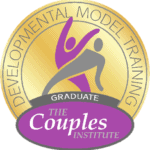Currently, the standard therapy session is 45-50 minutes. There is no actual scientific support for this; it has simply become a norm. However, that time frame doesn’t always work when there is more than one person in the room, such as with a couple or family. For couples therapy, more and more therapists are going to an 80–90-minute session. A longer time frame allows for working more fully with the dynamics between the couples. There is more time to get down into problematic patterns and develop skills to get out of them. Couples typically meet with a therapist every week or every other week. The hope from the therapist is that skills explored and taught in the session will be practiced between sessions. Yet, many couples either continue to avoid opening up any issues outside of sessions or they continue their fighting patterns, both of which lead to little progress. It can be disheartening for everyone involved.
An evolving trend in couples therapy is to offer extended sessions over one or two days. This is sometimes called a couples intensive or a couples retreat. They may range from what some call a deep dive for 3 hours on a single issue or to enhance connection, to intensive meetings for two or more days. With a longer time frame, more complex issues can be addressed. An advantage of a longer period of therapy is that couples can experience that they can go deep, explore painful interactions between them, and come out the other side with great understanding and empathy.
A couples intensive or retreat can be used to jump start weekly or biweekly couples therapy sessions. Visiting an expert in intensive couples therapy can more quickly uncover destructive patterns in the relationship or marriage and orient couples to focus on their role in the underlying dynamics. Getting away from home and responsibilities to bring the center of attention to the relationship can disrupt discouraging and unproductive behaviors.
Couples may be facing a crisis, have a breach of trust, a low or no sex marriage, blended family problems, or feelings of profound disconnection. Some couples have special medical or psychological challenges, such as traumatic brain injury or trauma histories who may not have a specialist in their area to help them get started. Weekly or biweekly therapy may not offer sufficient traction to build hope that the couples can make progress together.
Reaching out to a therapist who specializes in intensive couples therapy will begin with the therapist assessing whether you and your partner are good candidates to benefit from this type of approach. This is usually done with a phone consultation. A next step is to conduct a one- or two-hour assessment session with the couples, often online over Zoom or another platform. This allows for greater understanding for the therapist if the couples are good candidates to benefit from an intensive and it also allows the couples to ask any questions and to see if it is a good fit for them.
If the therapist feels they can offer something of value to the couple, a time for the intensive is scheduled and a series of preliminary questionnaires and assessments are sent to the couple. These questionnaires will vary from practitioner to practitioner, but they are an essential step in more quickly getting to know each person and the problems they are facing. Filling them out as fully and honestly as possible will allow the therapist to home in on crucial problems and behaviors to make the most of your time and energy.
Within an intensive, therapists will go over what to expect and there may be a review of what was learned from the questionnaires. Couples can expect that they will learn more deeply about how they and their partners see and experience the couple issues. They will learn how to manage their feelings in hearing how their partner thinks and feels, as well as techniques to stay present and curious. The clinician may sometimes work more with one person, then the other, may take some individual time to work with only one person, especially if that person is struggling to stay present. Practicing talking about difficult topics with a professional will create healing interactions that instill a sense of confidence and optimism. Two-day intensives add more opportunities for serious reflection. Specifics of scheduling are determined by the therapist and the couple.
At the end of the retreat time, the couples may be given an overview of what was done and suggestions for what to do going forward, as well as resources. Some therapists send this after the intensive is over. The intensive package cost may include follow up visits. All this should be made clear in the contract you receive from the therapist or therapy center.
Additionally, with signed authorization from both people in the couple, the intensive therapist can share insights with a couples therapist the couple is seeing in their area. This helps keep the progress made during the intensive moving forward.
Finally, couples intensives or retreats can be expensive up front, but the progress that can be made in a few days may take 4-6 months in biweekly therapy. Each couple should weigh the advantages and disadvantages of this approach.
I hope this overview of couple intensives or retreats has given you some food for thought, as well as hope.




Leave a Reply
You must be logged in to post a comment.